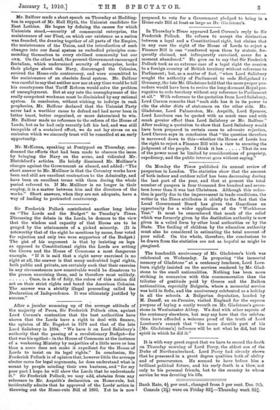In Thursday's Times appeared Lord Curzon's reply to Sir Frederick
Pollock. He refuses to accept the distinction between a legal and a Constitutional right, but claims that in any case the right of the House of Lords to reject a Finance Bill is one "conferred upon them by statute, fre- quently claimed, not infrequently exercised, never for a moment abandoned." He goes on to say that Sir Frederick Pollock took as an extreme case of a legal right the cession to a foreign country of British territory without reference to Parliament; but, as a matter of fact, "when Lord Salisbury sought the authority of Parliament to cede Heligoland to Germany, the late Mr. Gladstone held that the more proper pro- cedure would have been to revive the long-dormant Royal pre- rogative to cede territory without any reference to Parliament at all." With reference to the quotation from Lord Salisbury, Lord Curzon remarks that "each side has it in its power to cite the °biter dicta of statesmen on the other side. Mr. Gladstone, Lord Palmerston, Mr. Asquith, Lord Spencer, Lord Loreburn can be quoted with as much ease and with much greater effect than Lord Salisbury or Mr. Balfour." After making a quotation to show that Lord Salisbury would have been prepared in certain cases to advocate rejection, Lord Curzon says in conclusion that "the question therefore is narrowed down to this—whether the House of Lords has the right to reject a Finance Bill with a view to securing the judgment of the people. I think it has That its use of the power must be limited by considerations of propriety, expediency, and the public interest goes without saying."














































 Previous page
Previous page